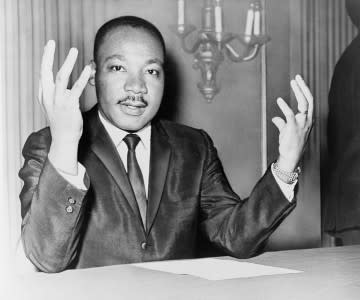How Dr. King cited the Constitution in his Mountaintop speech
On April 3, 1968, Dr. Martin Luther King Jr. made his last public speech, which referenced the Bible and the Constitution. His words still inspire millions today.
King was in Memphis, Tennessee to help support a sanitation workers’ strike. At the age of 39, he was already an internationally known figure. Starting with the Montgomery boycott in 1955, King had led a series of nonviolent protests against discrimination.
King spoke at the Bishop Charles Mason Temple to a group of supporters–knowing there were threats made against his life.
Link: Full Text of Speech
The best-known part of King’s speech was its conclusion.
“Like anybody, I would like to live a long life–longevity has its place. But I’m not concerned about that now. I just want to do God’s will. And He’s allowed me to go up to the mountain. And I’ve looked over and I’ve seen the Promised Land. I may not get there with you. But I want you to know tonight, that we, as a people, will get to the Promised Land. And so I’m happy tonight; I’m not worried about anything; I’m not fearing any man. Mine eyes have seen the glory of the coming of the Lord,” King said as he ended the speech.
The “we, as a people” reference in the conclusion wasn’t the only constitutional reference in his speech.
As you read the text of the Mountaintop speech, King gives an inspirational history of the civil rights movement and places it in the context of the ages and the late 20th Century. He then turns his attention to an injunction against the protesting sanitation workers.
“We have an injunction and we're going into court tomorrow morning to fight this illegal, unconstitutional injunction. All we say to America is, "Be true to what you said on paper." If I lived in China or even Russia, or any totalitarian country, maybe I could understand some of these illegal injunctions,” King said.
“Maybe I could understand the denial of certain basic First Amendment privileges, because they hadn't committed themselves to that over there. But somewhere I read of the freedom of assembly. Somewhere I read of the freedom of speech. Somewhere I read of the freedom of press. Somewhere I read that the greatness of America is the right to protest for right. And so just as I say, we aren't going to let dogs or water hoses turn us around, we aren't going to let any injunction turn us around. We are going on.”
The First Amendment right to peacefully protest was an integral part of King’s success in the civil rights movement. Later in the speech, King describes how the protesters can use an economic boycott to peacefully get their message across.
He also told the audience about how he survived a 1958 assassination attempt by a mentally deranged woman who stabbed King in the chest at a New York book signing. King had read in a newspaper that if he had sneezed just before the attack, the location of the wound have been fatal.
“I want to say tonight that I, too, am happy that I didn't sneeze. Because if I had sneezed I wouldn't have been around here in 1960, when students all over the South started sitting-in at lunch counters. And I knew that as they were sitting in, they were really standing up for the best in the American dream and taking the whole nation back to those great wells of democracy, which were dug deep by the founding fathers in the Declaration of Independence and the Constitution,” he said.
At 6:05 P.M. on Thursday, April 4, 1968, King was shot while standing on a balcony outside his second-floor room at the Lorraine Motel. One shot was heard coming from another location. King was rushed to a hospital and died an hour later.


